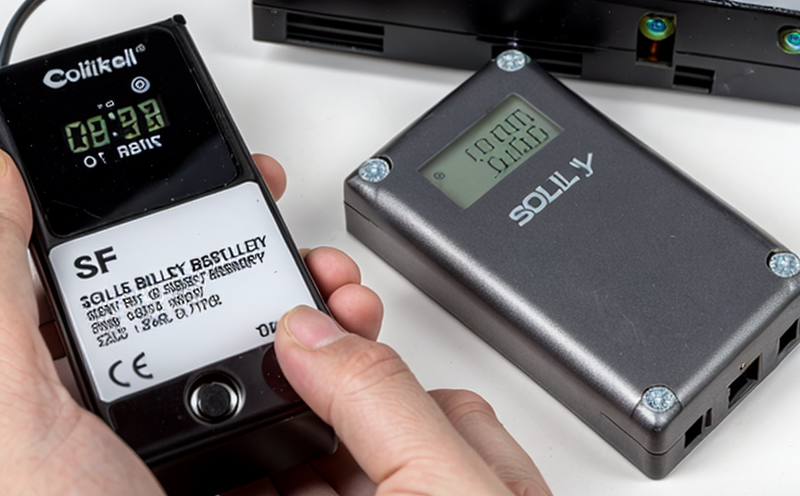UL 9540 Solid-State Battery Testing for Energy Storage Systems
The UL 9540 standard is a critical benchmark in ensuring the safety and reliability of energy storage systems (ESS) that incorporate solid-state batteries. As the demand for sustainable and efficient energy solutions continues to grow, compliance with this rigorous testing protocol has become essential for manufacturers and suppliers involved in ESS development.
Solid-state batteries represent a significant advancement over traditional lithium-ion batteries due to their superior safety profile and longer cycle life. However, these benefits come at the cost of increased complexity during testing. The UL 9540 standard addresses this by providing detailed guidelines for assessing the thermal stability, mechanical integrity, and electrical performance of solid-state batteries.
The testing process outlined in UL 9540 is designed to simulate real-world conditions that could potentially lead to failure or hazardous situations. This includes high-temperature exposure, overcharge scenarios, and puncture tests. By subjecting the battery specimens to these conditions, manufacturers can identify potential weaknesses early on in the development stage.
The methodology employed in UL 9540 involves a series of carefully controlled experiments aimed at replicating various stressors that may be encountered during normal operation or accidental exposure. These include but are not limited to:
- Thermal cycling between -20°C and +65°C
- Overcharge testing up to 130% of nominal voltage
- Puncture tests with specified force application
- Vibration tests simulating transportation conditions
The results from these tests are then analyzed using advanced analytical techniques such as thermogravimetric analysis (TGA), differential scanning calorimetry (DSC), and impedance spectroscopy. These methods provide insights into the thermal stability, phase transitions, and electrical conductivity of the solid-state battery materials.
Compliance with UL 9540 not only ensures product safety but also enhances brand reputation and market competitiveness by meeting stringent regulatory requirements. For manufacturers aiming to enter or expand their presence in the ESS market, adherence to this standard is non-negotiable.
Scope and Methodology
The scope of UL 9540 covers all aspects of solid-state battery testing relevant to energy storage systems. This includes assessing the mechanical integrity, thermal stability, and electrical performance of the batteries under various stress conditions. The methodology involves a series of carefully designed experiments aimed at replicating real-world scenarios that could potentially lead to failure or hazardous situations.
The tests include:
- Thermal cycling between -20°C and +65°C
- Overcharge testing up to 130% of nominal voltage
- Puncture tests with specified force application
- Vibration tests simulating transportation conditions
The results from these tests are analyzed using advanced analytical techniques such as thermogravimetric analysis (TGA), differential scanning calorimetry (DSC), and impedance spectroscopy. These methods provide insights into the thermal stability, phase transitions, and electrical conductivity of the solid-state battery materials.
Competitive Advantage and Market Impact
Compliance with UL 9540 provides manufacturers with a significant competitive advantage in the ESS market. By demonstrating adherence to this stringent standard, companies can:
- Safeguard against potential recalls or product failures
- Enhance brand reputation and consumer trust
- Maintain compliance with international regulations and standards
- Achieve faster market entry through streamlined regulatory processes
- Gain a competitive edge in bidding for large-scale ESS projects
In the current landscape of renewable energy and sustainability, the demand for reliable and safe energy storage solutions is at an all-time high. UL 9540 solidifies a manufacturer's commitment to delivering products that meet these stringent safety requirements, thereby positioning them as leaders in the industry.
Use Cases and Application Examples
The UL 9540 standard is particularly relevant for manufacturers of energy storage systems employing solid-state batteries. These batteries are increasingly being used in various applications due to their enhanced safety features compared to traditional lithium-ion cells. Some key use cases include:
- Utility-scale energy storage
- Ride-sharing and autonomous vehicle fleets
- Telecommunications infrastructure
- Data centers for cloud computing and internet services
In these applications, the reliability and safety of the battery pack are paramount. For instance, in utility-scale energy storage systems, any failure could result in significant financial loss or even environmental damage. Similarly, in ride-sharing vehicles, a compromised battery could pose serious risks to both passengers and drivers.
By adhering to UL 9540, manufacturers ensure that their products are robust enough to withstand the rigors of these demanding environments. This commitment to quality not only enhances the overall performance of the system but also ensures long-term sustainability by reducing the likelihood of costly repairs or replacements.





